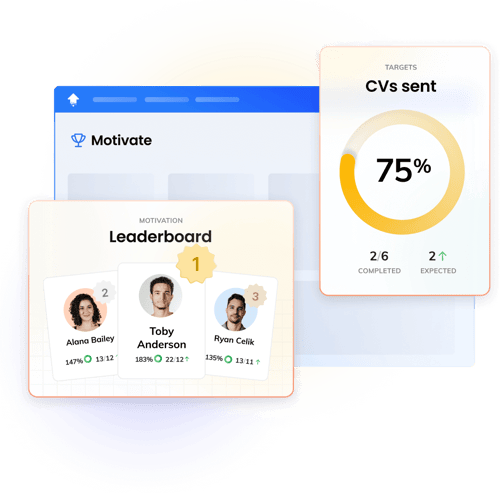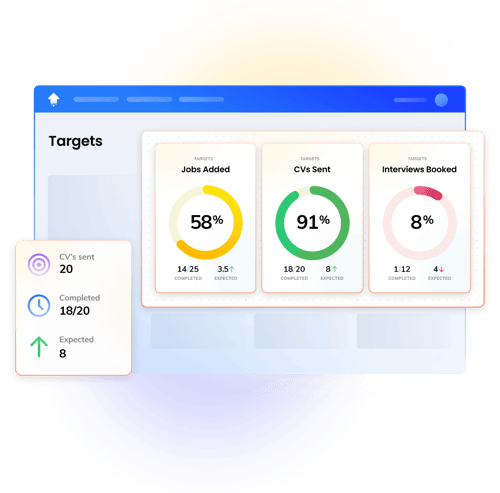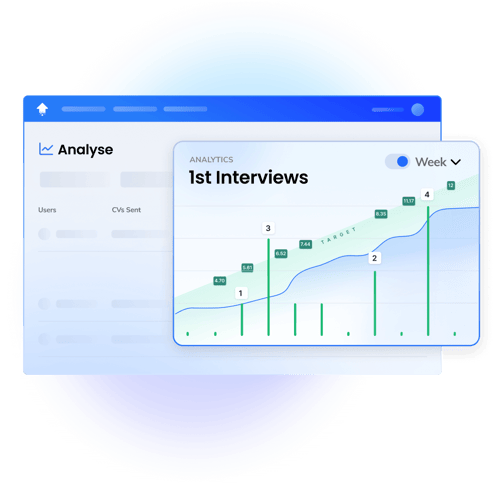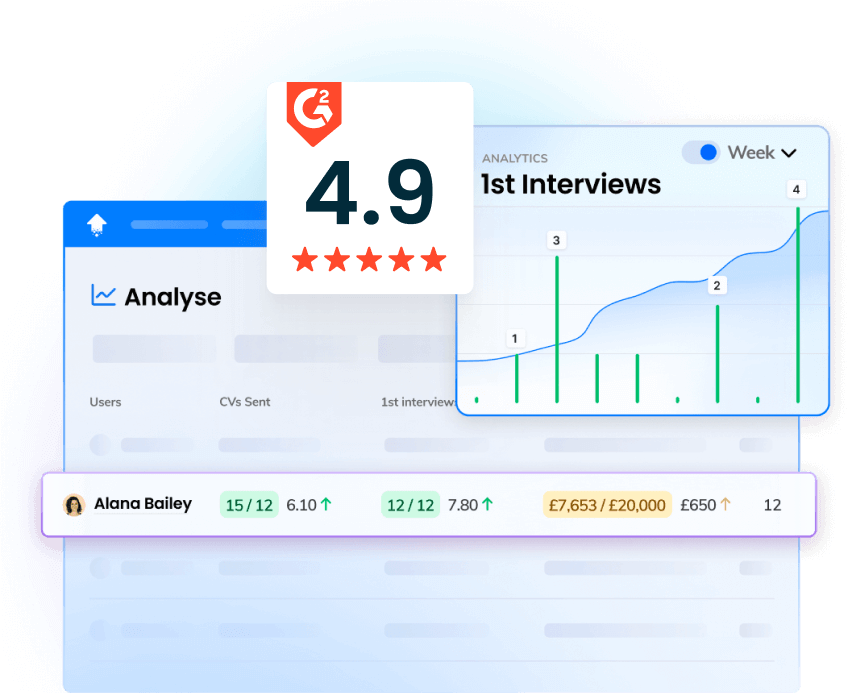A motivated recruitment team is a must-have in 2024. With the market getting tougher, we need more drive than ever before.
Think about it – the competition for top talent is super intense and things in the job world keep flipping and changing. So, your team's got to be quick on their feet, ready to jump on these changes and snag the best people out there.
Now, let's chat about why staying motivated is so important in recruitment.
Picture this: you're in a recruitment agency that's buzzing with activity. The market's tough, right? And it's super easy for your team to get burned out. And burnout is a real thing in this game.
You're there, juggling a million things - handling a bunch of recruiters and a load of clients. It's all about solving problems one minute, and putting out fires the next. And hey, making sure your team's pumped up and raring to go? Sometimes, that just slips down the to-do list.
But here's the catch – when motivation slips, it starts this tricky cycle. It's like a domino effect; once the energy dips, everything from performance to client satisfaction can start to wobble. And we don't want that, do we? So, let's dive into that a bit more and see how we can keep that motivation high.
Key Strategies for Boosting Recruiter Motivation
So how to motivate a recruiting team? Well, it's not just about pep talks and coffee runs. Some key strategies can turn things around.
Let’s explore these, and get your team not just back on track, but speeding ahead. Here we take you through 21 key approaches.
1. Leveraging Recruitment Motivation Software
In 2024, you no longer have to do it alone.
Leading tools such as OneUp recruitment motivation software help you to boost performance, drive accountability, and foster a culture of healthy competition — ultimately enhancing recruitment efficiency.
How does this work? This recruiting analytics software creates a single source of truth for your recruitment performance data, displays it in a transparent and easy-to-digest format, focuses your recruiting team around your specific targets, and gamifies work.
Essentially, it shows your team what success looks like.

OneUp empowers you to:
- Create targets for individuals and teams
- Establish leagues to create competition amongst recruiting teams or individuals
- Launch missions with tiered incentives that motivate your team to collaborate
- Issue head-to-head challenges between individual team members
- Connect your office display screens to share progress towards targets, results, live leaderboards and competitions, and more
- Create custom dashboards to focus your team on the targets that matter most
- Celebrate great performance by triggering messages to flash up on display screens when certain events – such as a candidate successfully placed in a role – occur

2. Setting Clear and Achievable Goals
If you don’t set targets for your recruitment agents that are aligned with overarching business goals, they won’t understand what their priorities should be.

But it’s not enough to simply set a vague target such as ‘increase your applicants per opening.’ Instead, define specific, measurable objectives that make it easy to track progress toward achieving recruitment goals.
Set SMART recruitment goals that are:
- Specific
- Measurable
- Achievable
- Relevant
- Time-Bound
For example: “Within the next three months, increase your average ‘applicants per opening’ by [X amount].”
3. Acknowledging and Rewarding Achievements
When a recruitment agent has hit a target, triumphed at work, or is on a high-performance streak — let them know it.
Recruitment managers can sometimes underestimate the effect praise and encouragement have on employees. But it helps them to feel valued, builds company loyalty, and motivates them to keep performing at a high level.
Don’t forget to let everyone else know too. Not only will this further motivate the successful employee to receive praise from their colleagues and senior managers — but it should also motivate other team members to match or exceed their colleague’s performance.
Acknowledging and rewarding achievements can take the form of:
- Praise in one-to-one meetings
- Praise in meetings with colleagues
- Praise in team communications e.g. your Slack channel or email newsletter
- Informing senior managers or directors of the agent’s success
- Monetary compensation
- Gift rewards e.g. restaurant vouchers
- Promotions and further coaching
You can even automate celebrations and praise to your office TVs and communications systems.
4. Offering Competitive Compensation
Competitive compensation has always been vital for attracting top talent within the recruitment sector.
But in the post-pandemic landscape, where employee career priorities have shifted, and with the cost of living crisis continuing to stretch household budgets, cold hard cash has never been more important.
This is why it’s vital to ensure salaries and commissions reflect your team’s effort and successes when it comes to motivating recruiters. Once you’ve set SMART goals for your agents, link them to tiered monetary incentives.
5. Promoting Career Growth and Development Among Talent Acquisition Professionals
As any recruiter knows, compensation is only one piece of the puzzle.
High-performers are often keen to advance in their career — and you want to keep them in your team — so it makes sense to help them achieve their personal goals.
Hold regular personal development meetings with your employees to track their progress towards their goals, and to find out what they want from their career.
Once you’ve got an idea of their goals, reward high levels of effort and performance with training sessions, coaching time, promotion opportunities, and a seat at a more senior table.
6. Building a Positive Work Environment
You need your employees to want to succeed – not just for themselves, but for you and their team.
No recruiter will shine in an office they dread entering every morning.
That’s why it’s crucial to foster a culture of support, inclusivity, and collaboration.
Yes, competition is to be encouraged, but keep it healthy. Incentivise collaboration and peer-to-peer coaching. Create team bonding moments to foster a culture of camaraderie. And use failures as an opportunity to teach rather than to criticise.
7. Utilising Data-Driven Insights
In 2024, success is built on data.
With OneUp recruitment software, you can drill down into the performance of each team member, empowering you to guide your motivational strategies and decisions with analytics.
What’s more, ensuring this data is transparent and prominently displayed throughout the office is an excellent motivational tool for competitive employees.
8. Encouraging Team Bonding and Unity
In some very lucky cases, a team will just gel.
But most of the time, managers need to put in some effort to encourage friendships, particularly with new employees. This means setting up team bonding activities, both in a corporate setting and outside it.
These activities could include:
- Team purpose activities such as coming up with a collaborative mission statement
- Fun problem-solving activities like escape rooms or a scavenger hunt
- Team communication activities like professional role-playing
- Trust-building activities like a game afternoon
- Informal social activities like a meal or a night out
It’s well worth putting the effort in, because the team bonding and unity built during such activities translates back into an office setting, boosting employee morale and motivation, and setting your team up for success.
9. Hiring Managers: Offer Flexible Working Conditions for Modern Recruiters
In the post-pandemic landscape, flexible working is no longer simply a nice-to-have.
Indeed, 2023 research from the CIPD found that 71% of employees view flexible working as important to them when considering a new role, while 66% of employers believe it’s important to offer a flexible working option when hiring managers are advertising new roles.
Managers who rule with an iron fist, and don’t allow for flexibility within employee schedules, will only demotivate their team and leave staff seeking out more flexible options elsewhere.
Conversely, adapting to remote working preferences and flexible schedules demonstrates your trust and value in your employees, motivating them to perform well for you.
10. Maintaining Open Lines of Communication
As a manager aiming to provide motivation, communication is key.
Feeling like your manager is unavailable or unapproachable — and ultimately doesn’t care about your performance — will decimate any employee’s motivation to do a good job.
Regular one-to-ones with plenty of feedback, an open-door policy during specified hours, and availability on channels such as phone, email, and messenger all facilitate strong communication between manager and recruiter.
But it’s even more important to ensure you are approachable, empathetic, and understanding when employees do open up to you.
11. Implementing Efficient Recruiting Tools
In 2024, there’s no need to sink your recruitment team’s precious time into minor admin tasks. You want them out there, meeting with lucrative hiring managers and placing high-quality candidates in top roles.
Invest in a future-proof tech stack with efficient talent acquisition tools, from AI-powered sourcing tools and candidate screening apps to applicant tracking systems and onboarding platforms.
This removes the tedium from a recruiter’s job, giving your agents their time back to focus on what they do best — and boosting their performance in the process.
12. Prioritising Employee Well-Being
Investing in employee well-being can result in increased employee engagement, reduced sickness, and higher levels of resilience.
Recruiters will also be more motivated, not just because they feel better in themselves, but because they feel valued in their role.
It’s important to integrate wellness programs that promote both mental and physical health.
These could include:
- Private health insurance
- Access to a counsellor or psychologist
- A mental health first aid scheme
- Flexible working
- Gym memberships
- Free healthy snacks
- Standing desks
- Exercise or meditation classes
- Team lunches
- Bike or walk to work groups
- Wellness resources
13. Establishing Effective Mentorship Programs
Pair experienced recruiters with new team members and watch them flourish.
As a new hire, it’s super helpful to have someone other than your manager to answer your questions and offer advice. It can also be motivating for more experienced staff to take on this new responsibility and have someone look up to them as an expert.
For your mentorship program to be successful, it’s important to carefully consider what training will be required for mentors, how many resources this will take for both parties, and which experienced recruiters should be paired with which new hires.
14. Celebrating Team and Individual Milestones
A tried and tested way to motivate a recruitment team, embedding celebrations in your office culture drives high performance.
It’s important to celebrate in proportion to each achievement to ensure such events continue to hold weight.
For example, a positive piece of customer feedback is worth mentioning in a team meeting or newsletter, while a team achieving the highest number of placements in a year may be worth a lunch on the company credit card.
15. Empowering Recruiters with Autonomy
Have you ever had a micromanager?
And during that time, did you feel motivated to do your best work?
We didn’t think so…
Allow freedom in recruitment approaches and see what your team can do for your business. A motivating manager offers support and guidance but doesn’t dictate a recruiter’s every action.
After all, when you’re under the rule of a micromanager, often your successes don’t feel like your own — and where’s the motivation in that?
16. Providing Regular, Constructive Feedback
Feedback is a vital tool, not just for improving performance, but for motivating employees.
If recruiters don’t feel their manager is paying attention to how they are performing or doesn’t care about their career development, they’re unlikely to be inspired to do their best work. This can be even more damaging if they believe they’re the only person the manager is not engaged with.
Set up regular one-to-one meetings dedicated to personal development, using real-time data and constructive feedback to help your recruiters hit their talent acquisition targets and achieve their career goals.
And don’t forget to give positive feedback too!
17. Fostering a Culture of Continuous Learning
Invest in your talent by giving them the time and inspiration to constantly upskill and improve in their roles.
This can take the form of:
- Training sessions
- Coaching
- Conferences and networking events
- Sponsored professional qualifications
- Updates on the latest talent acquisition news
- Dedicated time for reading and research
To make this part of your team’s culture, encourage regular conversations surrounding recent learnings, examples of outstanding work, or milestones that have been hit.
18. Leading by Example To Inspire
As a manager, you want your team to look up to you.
You want each person on it to strive to get to where you are in your career.
But inspiring a team isn’t a given — you need to lead by example. This means coming across as extremely motivated yourself: celebrating when you hit your targets, and working even harder when you fail.
Where appropriate, it could also be worth sharing your targets with your team so they can follow your journey to success, and hopefully feel inspired.
19. Personalising Motivation Strategies
Most motivational managers recognise they have a team of individuals, all with different strengths, weaknesses, and needs. They can then tailor their motivational strategies to each employee.
What motivates you as a recruiter?
Asking each employee this question is the best place to start. Then, observe their behaviour in the office — what truly excites them, and what leaves them feeling flat?
Some employees will be motivated by big bonuses and plenty of autonomy. Others will need frequent feedback meetings with you and will be motivated by teamwork.
Once you get to the bottom of these individual desires, you can create bespoke motivation strategies to get the most out of every employee.
20. Facilitating the Sharing of Knowledge and Best Practices
Encourage learning and collaboration within the team for a motivational boost. Sharing talent acquisition knowledge is a productive way to get the whole team amped up to hit their targets and engage them with the recruitment sector as a whole.
Create space for teams to do this, whether in collaborative problem-solving sessions, or a monthly meeting where every attendee is expected to come with an interesting new learning to present.
21. Adapting to Recruiting Industry and Market Changes
Being at the forefront of an industry is a motivational feeling.
After all, no recruiter wants to feel like they’re at a company that is being left in the dust by a rival.
As a manager, it’s your responsibility to ensure your team is on top of the latest recruiting industry and market changes in the recruitment sector and to provide training to futureproof your employees where necessary.
This will help to ensure your team feels they are working for a key industry player at the front of the market.
Final Thoughts
Motivation is vital for achieving successful recruitment outcomes and fostering a positive work environment.
But to be motivating recruitment teams in 2024, you need to come armed with tech fit for the market.
By building a seamless tech stack, you can keep recruiters motivated with crystal clear targets and prominently display their progress towards those objectives. You can celebrate their triumphs, and empower them to be accountable for their results.

Leaving behind outdated systems like recruitment CRMs, spreadsheets, and overly complex tools, also gives your team the gift of time. And this allows them to focus on the bits of recruiting they enjoy.
What could be more motivational than that?
Want to find out more about how to motivate a recruitment team? You can book a OneUp product demo here.




